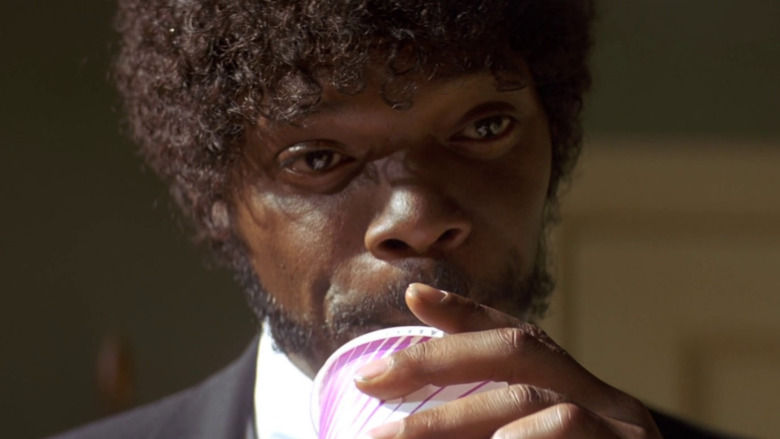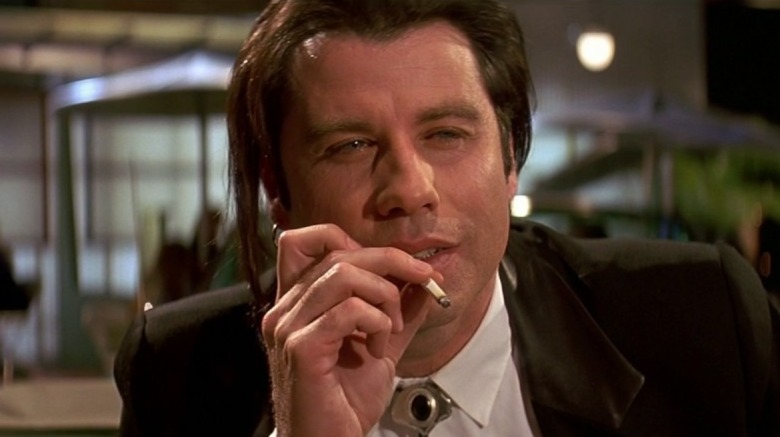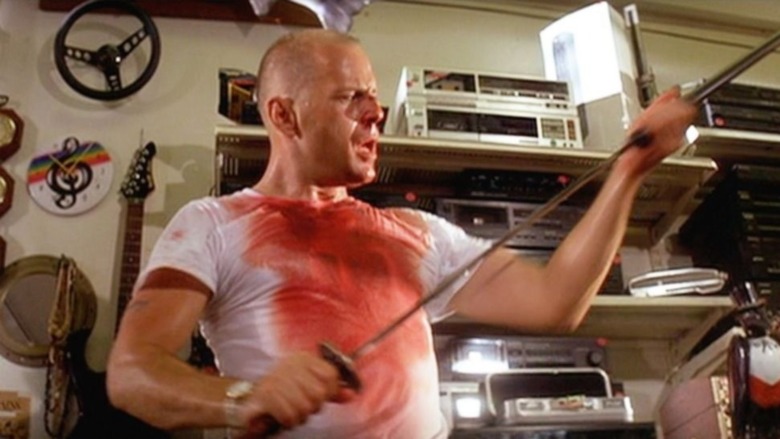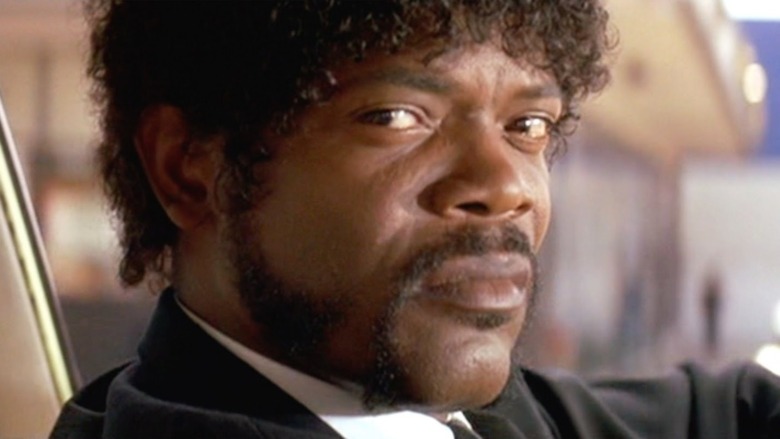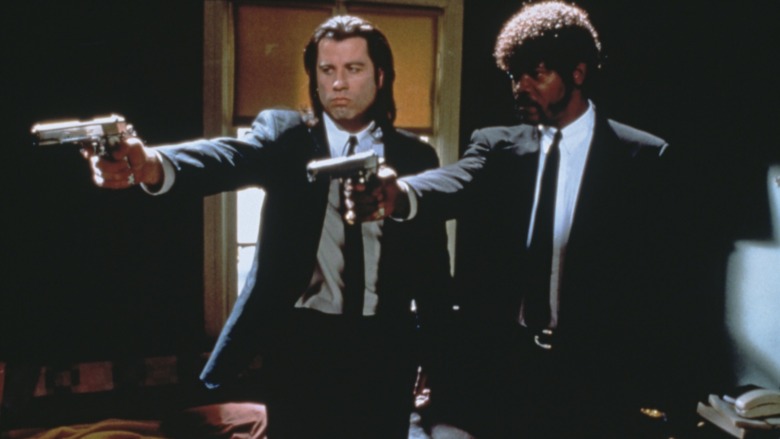The Ending Of Pulp Fiction Explained
Many people already know and love the Quentin Tarantino-directed classic, "Pulp Fiction." It's one of the most popular and critically praised films ever made, ranking it at number five on The Hollywood Reporter's "Top 100 Movies of All Time" list. However, the title on its own might not hold too much meaning to the average consumer.
The title itself is a direct reference to the "pulp" novels and magazines of the twentieth century, a medium that explored and pioneered many of the ideas that would go on to become successful American fiction, including the aforementioned movie. In the context of Tarantino's work, the influence of pulp provides the tone of the film — like how an ice cream's name lets you know what the flavor will be even before you taste it.
Yet Tarantino uses this as an opportunity to play with the classic American genre, twisting it around and combining it with a variety of film influences. It tells the interweaving, non-chronological stories of several criminal-affiliated characters during the same rough span of time. Each character goes on their own journey over the course of the film, but the entire affair adds up to be more than the sum of its parts. However, it is still important to know how each individual story ends before looking at the big picture.
Vincent Vega gets undone by his own idiocy
Vincent Vega (John Travolta) isn't a horrible guy for a hitman. As Jules' (Samuel L. Jackson) partner in crime, he seems amiable enough. However, he also tends to be distracted by other matters, and he is ultimately undone because he rarely considers the full situation. Still, he proves himself capable and even a bit heroic despite how foolish some of his decisions are.
His primary story arc outside of his adventures with Jules focuses on his outing with Mia Wallace (Uma Thurman), the wife of his boss, Marsellus Wallace (Ving Rhames). Most of the story focuses on the two's interactions as they build a rapport, and perhaps even feel a romantic connection. Knowing that sleeping with his criminal boss's wife is a death wish, Vincent does his best to abstain. But before anything can occur, Mia overdoses on the heroin Vincent left in his unattended jacket. Since it's his drugs and he is Mia's escort, Vincent is at least partially at fault for the event. Luckily, he comes through after reviving Mia with an adrenaline shot.
Vincent escapes this caper by the skin of his teeth (as he did many times throughout that fateful day). After all, Mia could have easily died. But one's luck can only go so far, and only a fool leaves their gun on a target's kitchen counter so they can use the toilet. For that simple mistake, Vincent Vega goes from suave to swiss cheese.
Butch learns not to rob the mob
Despite being a fool and an assassin, Vincent Vega was still a likable character. That's why it hurts to watch Butch Coolidge (Bruce Willis) gun him down. However, it's hard to blame Butch. It was technically in self-defense, after all. And while Vincent Vega learned a hard lesson about caution and forethought, Butch was about to learn his own lesson about double-crossing people.
Vincent was only in Butch's place because the latter went back on a deal with Marsellus Wallace. Butch was supposed to throw a rigged boxing match, but he bet on himself and accidentally killed his opponent instead. To avoid Wallace's hitmen, Butch goes on the run with his girlfriend. He only returns to his house because she forgot to pack his father's military watch, which happened to be disgustingly smuggled out of a Vietnamese POW camp via Christopher Walken's digestive system.
The only way Butch manages to make amends is when he runs into Wallace on his way back from retrieving the watch. The two chase each other down the street before ending up in the world's most evil pawn shop run by hillbilly rapists. They restrain the two foes and proceed to have their way with Wallace before Butch escapes. At the last moment, however, Butch has a change of heart and redeems himself in the eyes of Wallace by rescuing him with a samurai sword. Wallace proceeds to let Butch go.
Jules has a change of heart
When Quentin Tarantino was still casting for "Pulp Fiction," he had a difficult time deciding who would play as Jules. However, he became set on Samuel L. Jackson after bringing the actor in for a second round of auditions. "It was like we were sitting in the theatre watching the end of the movie," Tarantino said in a video interview.
This is no small compliment. The movie's final scene is perhaps the most intense and exciting moment in the movie, and it's almost entirely focused on Jules' character. After surviving a shootout due to an apparent miracle in the film's beginning, Jules undergoes a change of heart. Vincent remains a skeptic (we see where that leaves him), but Jules is convinced. When the diner where Jules and Vincent are enjoying lunch gets held up by a Bonnie and Clyde-style criminal duo, Jules manages to talk the pair down.
The Jules that we meet at the beginning of the film would have shot those two dead immediately. But instead, Jules shows serious growth in a short amount of time. And as a serious mother-lover, Jules isn't messing around. In not killing the two wannabe crooks, and, instead, giving them money, Jules begins a journey to redeem his life of crime. Unfortunately, we don't get to see this journey because the movie ends, but Jules' speech about the uncertainty of his moral situation has gone down in history as one of film history's most magical moments.
Each of these stories is about the characters' choices
In an interview with AFI, Tarantino explains that while not every story in "Pulp Fiction" fits as neatly into the archetype of a redemption tale as Jules', redemption and choices are major themes.
"The characters in the movie are given choices," Tarantino said. "And they pay the price or they live to tell the tale because of those choices." This is evident from the differing conclusions to Vincent and Jules' stories, where Jules makes the more morally justifiable decision and so lives another day while Vincent does not. Meanwhile, Butch makes the dishonorable decision to go back on his deal with Wallace and has to make up for it by saving him.
When these three stories are combined, they give an interesting (albeit well-known) moral to "Pulp Fiction" as a whole. Even in a world that worships violence as much as "Pulp Fiction," one good act begets another. Whether it's Jules trying his best to save the diner crooks (who both open and close the film), or the divine intervention that motivates him to do so in the first place, kindness is the most powerful tool in every characters' arsenal.
